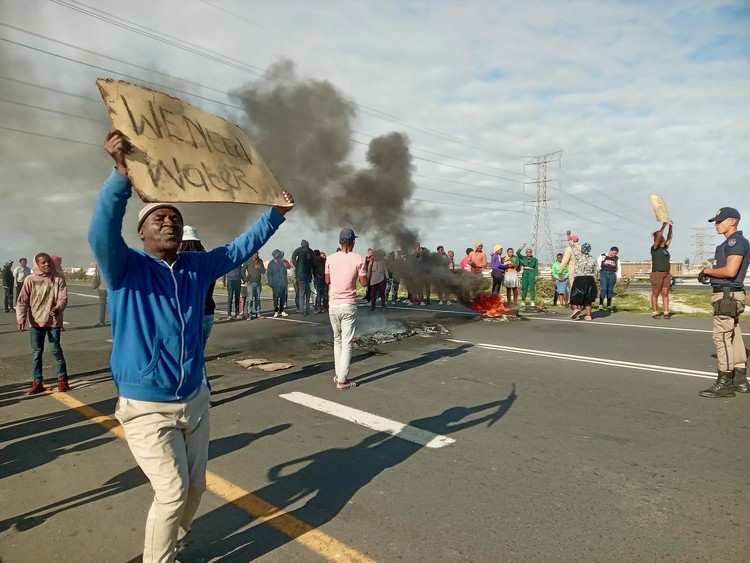Cape Town’s relocated railway occupiers protest over water
The R300 was blocked for several hours in what the community say was a “last resort” to be heard
Families that were relocated from Cape Town’s central railway line to Philippi East blocked the R300 for several hours on Monday afternoon over water. Photo: Sandiso Phaliso
People who were relocated from Cape Town’s central railway line reserve to PRASA land at Stock Road, Philippi East, blocked the R300 for several hours on Monday afternoon to demand water.
More than 100 protesters from what is now called Loyiso Nkohla Mabandla village used bags full of rubbish and bricks to block the road.
Carrying a placard reading, “We need water as a matter of urgency”, Thulani Mnqweno told GroundUp, “We are in the middle of nowhere … not even a single water tap.”
Prudence Malinga said blocking the R300 highway was a last resort.
“The language that the government knows is protest, and a violent protest,” said Malinga.
The 900 families were relocated as part of Operation Bhekela, a joint venture between PRASA, the City, the Housing Development Agency (HDA), and the provincial and national governments to restore Metrorail services.
When the families arrived on the site in December, there was no water or sanitation infrastructure. To date no standpipes have been installed.
In March residents complained bitterly about the lack of water to Parliament’s Standing Committee on Public Accounts when it conducted an oversight visit.
The City has since said it has been delivering water several times a day with a 7,000-litre tanker on the three days a week it delivers.
But community leader Zanele Ngcobondwana said on Monday, no water has been delivered for over a week. They have been buying water or relying on the good will of residents in Acacia and Heinz Park or going to other informal settlements that do have communal taps.
The City previously stated it had not installed bulk service infrastructure because the land was not zoned for residential purposes. For not rezoning the land prior to families moving there, the City has fined PRASA R25,000.
Colonel Andrè Traut of SAPS said the crowd dispersed when Public Order Police arrived on the scene and no further action was required. No case was opened and no one was arrested.
Mayco member for water and sanitation Councillor Zahid Badroodien said the last water delivery took place on 18 June.
“Additional water delivery unfortunately did not take place last week due to operational limitations at the time. The City regrets any inconvenience caused.”
Badroodien said following Monday’s protest the City dispatched a water tanker on Tuesday (25 June) and will be in the area on Wednesday and Thursday.
Support independent journalism
Donate using Payfast

Don't miss out on the latest news
We respect your privacy, and promise we won't spam you.
Next: Standoff in Musina as protesters demand resignation of municipal manager
Previous: We have no engineer to build your houses, official tells Kariega protesters
Letters
Dear Editor
Isn't it strange, that all these people willingly occupied the railway lines without any thought of the lack of water and sanitation infrastructure? They have been forced to move from there for very obvious reasons (being the railway was declared unusable). Why were they allowed to squat in a blatantly illegal space and allowed to flourish exponentially for many years - and this without the necessary infrastructure. Today, the people of Khayelitsha and Mitchell's Plain are still paying a horrendously hefty price in travelling cost because of this illegal occupation. But do you think they care? Now that these illegal occupiers were forced to be removed, the whole City has to be subjected to inconsiderate, inconvenient and sometimes violent protests in order to now service their needs. My question is, where are all these people coming from? The miraculous appearance of hundreds of thousands of people and huge amounts of informal settlements springing up all over the Western Cape is definitely putting a huge strain on the already overburdened infrastructure. When will this phenomenon come to a head?
© 2024 GroundUp. This article is licensed under a Creative Commons Attribution-NoDerivatives 4.0 International License.
You may republish this article, so long as you credit the authors and GroundUp, and do not change the text. Please include a link back to the original article.
We put an invisible pixel in the article so that we can count traffic to republishers. All analytics tools are solely on our servers. We do not give our logs to any third party. Logs are deleted after two weeks. We do not use any IP address identifying information except to count regional traffic. We are solely interested in counting hits, not tracking users. If you republish, please do not delete the invisible pixel.

